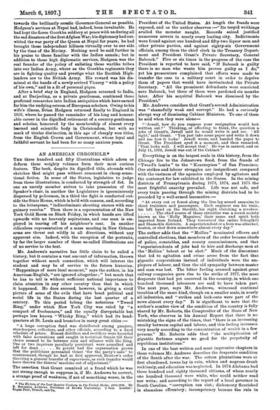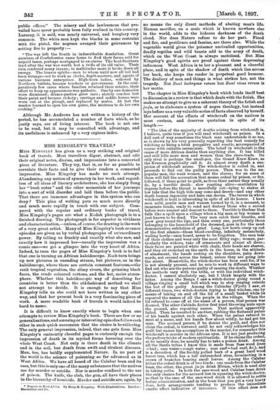AN AMERICAN CHRONICLE.*
THE three hundred and fifty illustrations which adorn or deform these weighty volumes form their most curious
feature. The book, despite its dignified title, abounds with sketches that might pass without comment in cheap sensa- tional fiction. In some of the States, legislation to judge from these illustrations, is conducted by strength of fist. In one an unruly member strives to take possession of the Speaker's chair, in another the Legislature is ignominiously dispersed by policemen, in a third the fight is conducted out- side the State House, which is held with cannon, and, according to the letterpress, "indiscriminate shooting ensues with san- guinary results." Then there is a representation of the New York Gold Room on Black Friday, in which hands are lifted upwards with no heavenly aspirations, and one man is em- ployed in tearing off his neighbour's coat. In another ridiculous representation of a mass meeting in New Orleans arms are thrust out wildly in all directions, without any apparent aim. Indeed, with the exception of the portraits, by far the larger number of these so-called illustrations are of no service to the text.
Mr. Andrews's narrative has little claim to be called a history, but it contains a vast amount of information, thrown together without much connection, which will interest the student and may be of service to the future historian.
" Happenings of mere local moment," says the author, in his American-English, " are ignored altogether ; " but much that he has to tell is without sufficient national importance to
claim attention in any other country than that in which it happened. He does succeed, however, in giving a vivid picture of some of the evils that have beset political and social life in the States during the last quarter of a century. To this period belong the notorious "Tweed Ring," under which New York City was ruled by " a
compact of freebooters," and the equally disreputable but perhaps less known " Whisky Ring," which had its head- quarters at St. Louis and branches in many great cities :—
"A huge corruption fund was distributed among gaugers, storekeepers, collectors, and other officials, according to a fixed schedule of prices. Honest distillers and rectifiers were hounded with false accusations and caught in technical frauds till their choice seemed to lie between ruin and alliance with the Ring. One or two inquirers peculiarly persistent were assaulted and
left for dead So potent had the organisation grown that the politicians persuaded Grant 'for the party's sake' to countermand, though he had at first approved, Bristow's order directing a general transfer of supervisors, as such transfer would have thrown the thieves' machine out of adjustment."
The assertion that Grant connived at a fraud which he was not strong enough to suppress is, if Mr. Andrews be correct,
a strange proof of weakness, if not of something worse, in the
• The Hi+tory of the Last Quarter Century in the Vetted States, 1870-1895. By E. Benjamin Andrews, President of Brown University. 2 Yobs. London : Keg= rani, Trench, and Co.
President of the United States. At length the frauds were exposed, and as the author observes :—" Its torpid writhinge availed the monster naught. Records seized justified numerous arrests in nearly every leading city. Indictments were found against one hundred and fifty-two liquor men and other private parties, and against eighty-six Government officials, among them the chief clerk in the Treasury Depart- ment and President Grant's Private Secretary, General Babcock." Five or six times in the progress of the case the President is reported to have said, " If Babcock is guilty there is no man who wants him proven guilty as I do," yet his prosecutors complained that efforts were made to transfer the case to a military court in order to deprive them of papers that would have incriminated the Private Secretary. " All the prominent defendants were convicted save Babcock, but three of them were pardoned six months later. After his acquittal Babcock was dismissed by the President" Mr. Andrews considers that Grant's second Administration was "shamefully weak and corrupt." He had a curiously abrupt way of dismissing Cabinet Ministers. To one of them he said when they were alone-
" 'Jewell, how do you suppose your resignation would look written out ? ' Thinking, or affecting to think, the question a joke of Grant's, Jewell said he would write it and see. All right,' said Grant. ` Yon just take some paper and write it down and see how it looks.' Jewell wrote, and handed the paper to Grant. The President eyed it a moment, and then remarked, ' That looks well. I will accept that.' He was in earnest, and on July 11, 1876, Jewell was out of the Cabinet."
Everything is on the largest scale in this history, from the Chicago fire to the Johnstown flood, from the frauds of " Tweed's lambs " to the " Kearneyism " of San Francisco.
Our strikes and labour struggles are insignificant compared with the vastness of the agencies employed by agitators and the contempt for law exhibited in the States. In the mining- districts of Pennsylvania during 1873, 1874, and 1875 the most frightful anarchy prevailed. Life was not safe, and every train passing through the mining districts had to be preceded by a well-armed locomotive :-
" At every cut or forest along the line lay armed assassins to shoot trainmen and passengers. Each engineer ran his train, his left hand on the throttle, his right clutching a revolver_
The chief source of these atrocities was a secret society known as the Molly Maguires,' their name and spirit both imported from Ireland. They terrorized the entire Schuylkill and Shamokin districts. A superintendent or a boss was attacked, beaten, or shot down somewhere almost every day."
The author adds that the " Mollies " nominated officers and controlled elections, that members of the order became chiefs of police, constables, and county commissioners, and that "superintendents of jobs had to hire and discharge men at the Mollies' behest or be shot." Much of the discontent that led to agitation and crime arose from the fact that gigantic corporations instead of individuals were the em- ployers of labour, and thus the old sympathy between master and man was lost. The bitter feeling aroused against great railway companies gave rise to the strike of 1877, the most desperate that had yet occurred in the country, in which one hundred thousand labourers are said to have taken part. The next year, says Mr. Andrews, witnessed continual troubles of the same kind, though on a smaller scale, in nearly all industries, and " strikes and lock-outs were part of the news almost every day." It is significant to note that the author's sombre view of the condition of the country is fully shared by Mr. Roberts, the Comptroller of the State of New York, who observes in his Annual Report that there is no mistaking the signs of the times, that "there is an increasing enmity between capital and labour, and this feeling increases very nearly according to the concentration of wealth in a few persons." Mr. Roberta adds that "the multiplication of gigantic fortunes augurs no good for the perpetuity of republican institutions."
In one of the best written and most impressive chapters in these volumes Mr. Andrews describes the desperate condition of the South after the war. The cotton plantations were at first abandoned, towns lay in ruin, whites and negroes drank recklessly, and education was neglected. In 1874 Alabama had three hundred and eighty thousand citizens, of whom nearly one hundred thousand were white, who could neither read nor write ; and according to the report of a local governor in South Carolina, "corruption ran riot ; dishonesty flourished in shameless effrontery ; incompetency became the rule in public offices." The misery and the lawlessness that pre- vailed have never probably been fully realised in this country. Larceny, it is said, was nearly universal, and burglary very common. The white men kept the blacks in some restraint with the pistol, the negroes avenged their grievances by setting fire to property :—
" The war left the South in indescribable desolation. Great numbers of Confederates came home to find their farms sold for unpaid taxes, perhaps mortgaged to ex-slaves The best Southern land after the war was worth but a trifle of its old value. Their ruin rendered many insane ; in multitudes more it broke down all energy. The braver spirits—men to whom until now all toil had been strange—set to work as clerks, depot-masters, and agents of various business enterprises. High-born ladies, widowed by Northern bullets, became teachers or governesses. In the com- paratively few cases where families retained their estates, their effort to keep up appearances was pathetic. One by one domestics were dismissed ; dinner-parties grew rare ; stately coaches lost their paint and became rickety ; carriage and saddle horses were worn out at the plough, and replaced by mules. At last the master learned to open his own gates, the mistress to do her own cooking."
Although Mr. Andrews has not written a history of the period, he has accumulated a number of facts which, as he justly says, are of living interest. The book is not one to be read, but it may be consulted with advantage, and its usefulness is enhanced by a very copious index.







































 Previous page
Previous page